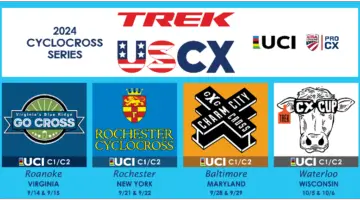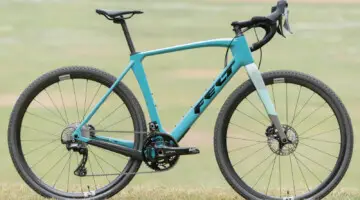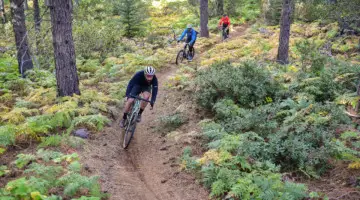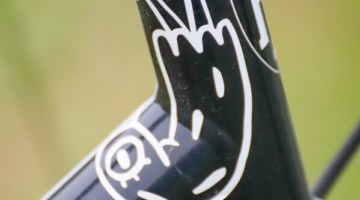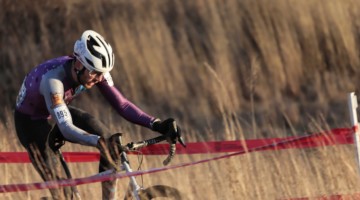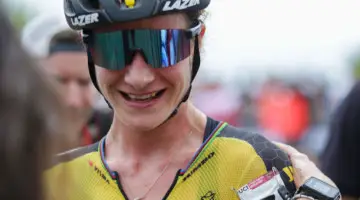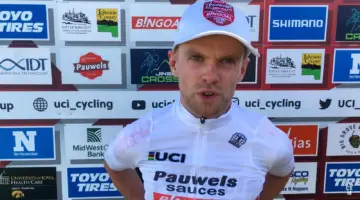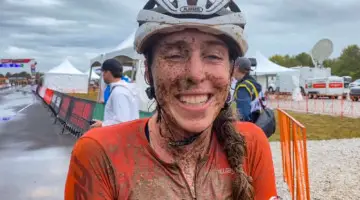Heading into the 2016 cyclocross season, Ben Frederick’s career was on a noted upswing. The season before he had finished in the top five at six different UCI cyclocross races and finished just outside the top 10 at Asheville Nationals.
Those results suggested the Virginian turned NECXer would be a force to be reckoned with during the 2016 domestic season.
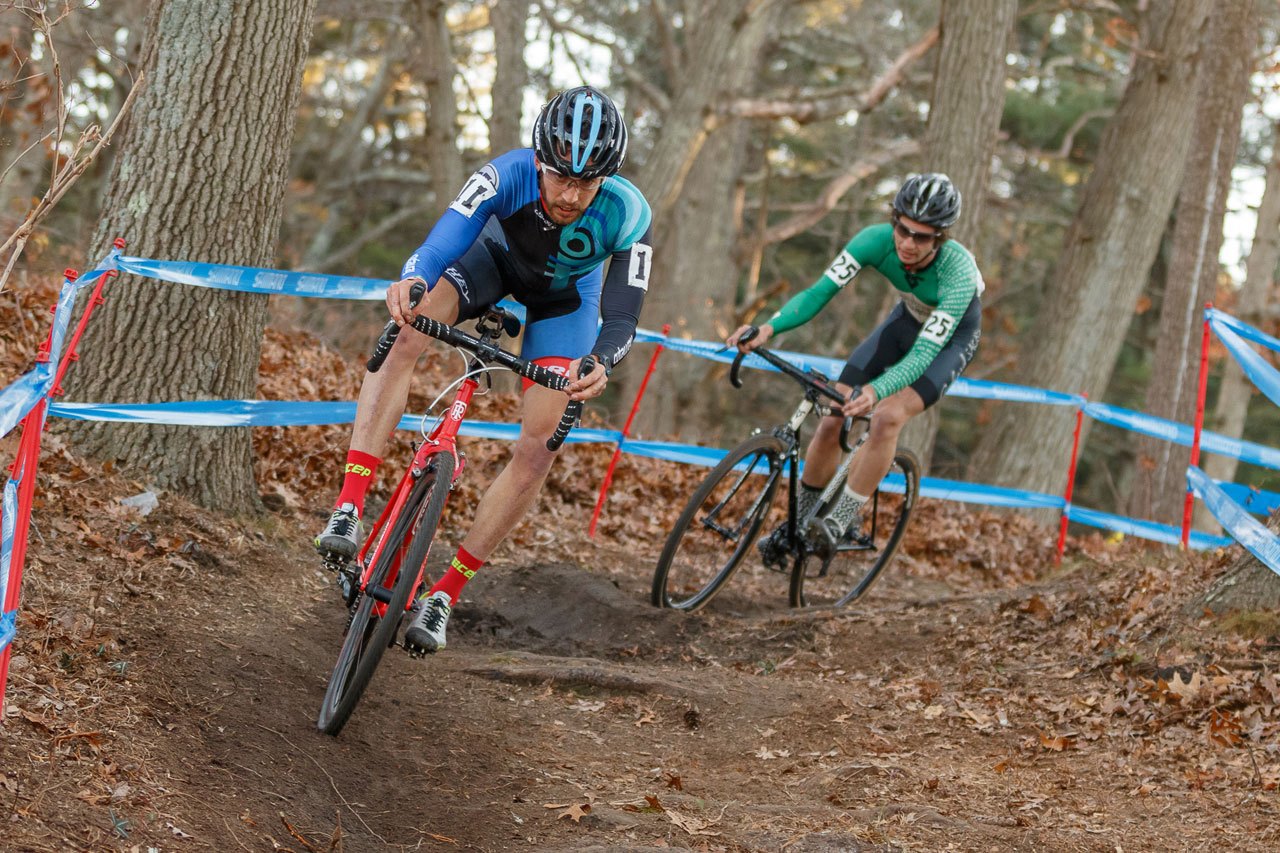
Ben Frederick (left) raced near the front of the domestic UCI scene in 2015. 2015 NBX Grand Prix. © Todd Prekaski
Then everything changed for Frederick in an instant.
The ride was nothing special, just a 5-hour training ride with some dirt trails thrown in—cyclocross season was just a couple weeks away, after all. Then Frederick went down and hit his head, hard.
“I hit my head on a stupid crash where I wasn’t doing anything technical, the equivalent of catching your toe on a curb,” he recalled. “I just happened to hit my head in soft sand which transferred all of my 20 mph of momentum into my skull instead of dissipating the momentum by bouncing or sliding.”
Frederick tried to finish the ride, but then a few days later, he found himself in the hospital with a traumatic brain injury. Instead of racing the biggest ’cross races in the U.S., he was stuck in a dark room in a deep fog.
Slowly, Frederick recovered. He eventually got out of the dark room and made it into the sunshine. For someone who was once chasing “The Pro Dream,” riding bikes has changed.
“‘Every training ride, watt and result matters’ to ‘I can’t leave a dark room, nothing is worth making this happen again’ to ‘I love racing my bike, no matter what level’ is a hard journey to describe in a concise way,” he said.
Frederick returned to racing cyclocross in 2018, and this season, he is back competing near the front of North American UCI races. He kicked off his season with a 5th and an 8th at GO Cross, continued with several top-ten UCI finishes and reached the podium both days at the Verge Northampton International earlier this month.
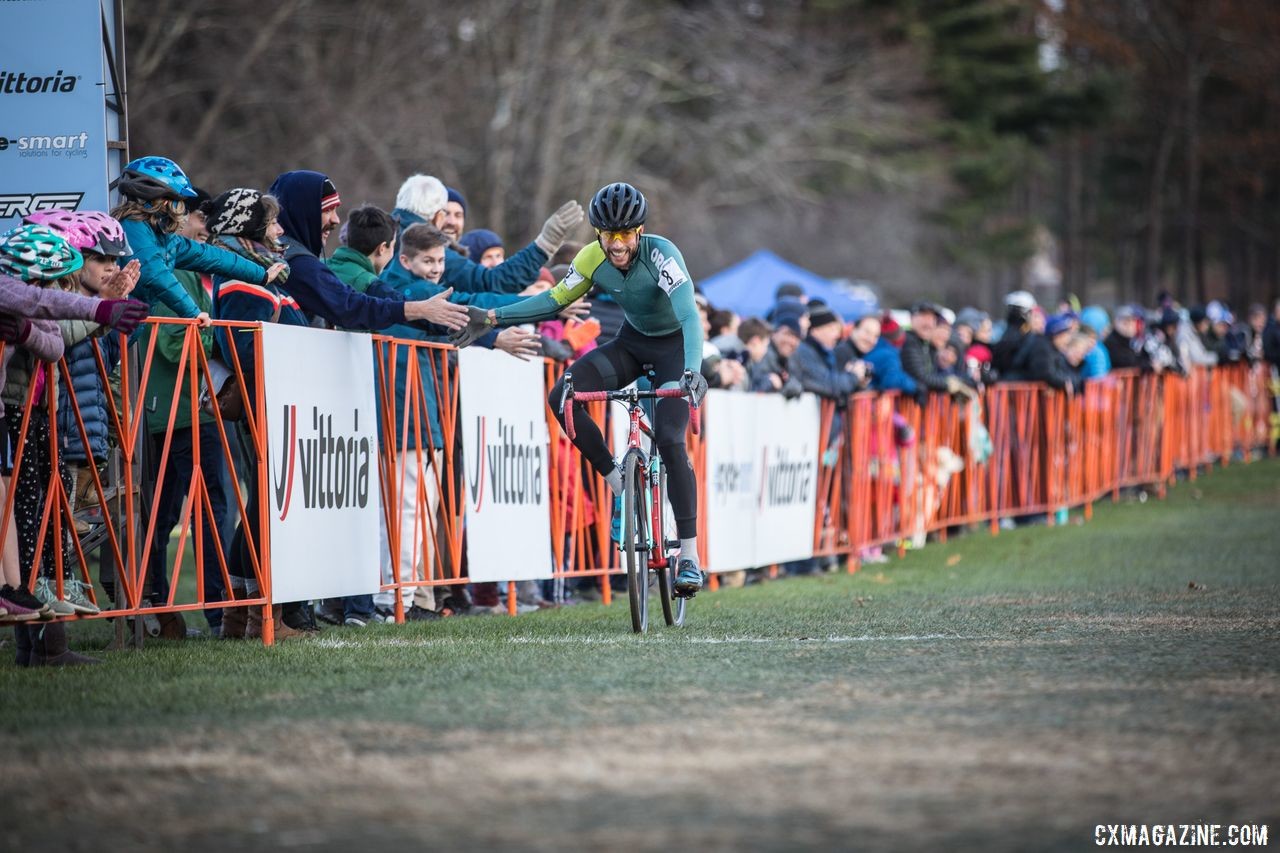
Ben Frederick celebrates his third-place finish. 2019 Northampton International Day 2. © Angelica Dixon
Cyclocross Magazine‘s Andrew Yee, himself someone who has suffered a few too many bumps to the head, sat down to chat with Frederick about his injury early this season and road to recovery. You can read the transcript of their short conversation below.
Hopefully, Frederick’s story will offer a good reminder of what we have to be thankful for this Thanksgiving. We wish all of you a great holiday.
Interview: Ben Frederick on Recovering from a TBI
Cyclocross Magazine: We last saw you knocking on the door of becoming one of cyclocross’ top stars, and then had a terrible accident and faced a long road to recovery, with post-concussion symptoms and complications. How are you now, and are you fully recovered?
Ben Frederick: Thanks for the kind words! I was doing my best to realize that dream. I’m doing pretty well now. Concussion-wise, I would say I’m as recovered as I’m going to be. There are a few small symptoms here and there buy in the grand scheme of how these things can go, I’m hugely grateful to have gotten to this point.
CXM: What do you remember about the accident?
BF: Believe it or not, I can remember almost everything that happened. I hit my head on a stupid crash where I wasn’t doing anything technical, the equivalent of catching your toe on a curb. I just happened to hit my head in soft sand which transferred all of my 20 mph of momentum into my skull instead of dissipating the momentum by bouncing or sliding.
I can even remember going, “Woah. I really hit my head there. But I should finish the interval.” From there, things got worse and worse over the next four days. I ended up going to the hospital and then spending the next four months in a dark room.
CXM: We’ve seen you racing crits, a potentially more dangerous bike racing discipline than cyclocross. What are the chances of making another run at pro cyclocross racing?
BF: That is a hard question to answer, even to myself. I have some secret goals for the year that might inform that decision for 2020. I would try and do it differently this time. Living barely month-to-month, race-to-race was so stressful. Keeping a job, having health insurance, being able to pay for things that break. I wouldn’t focus as much on the volume to help with life balance and recovery. Smash the intervals super hard and focus on the rest. If balance is possible and the results follow? Maybe.
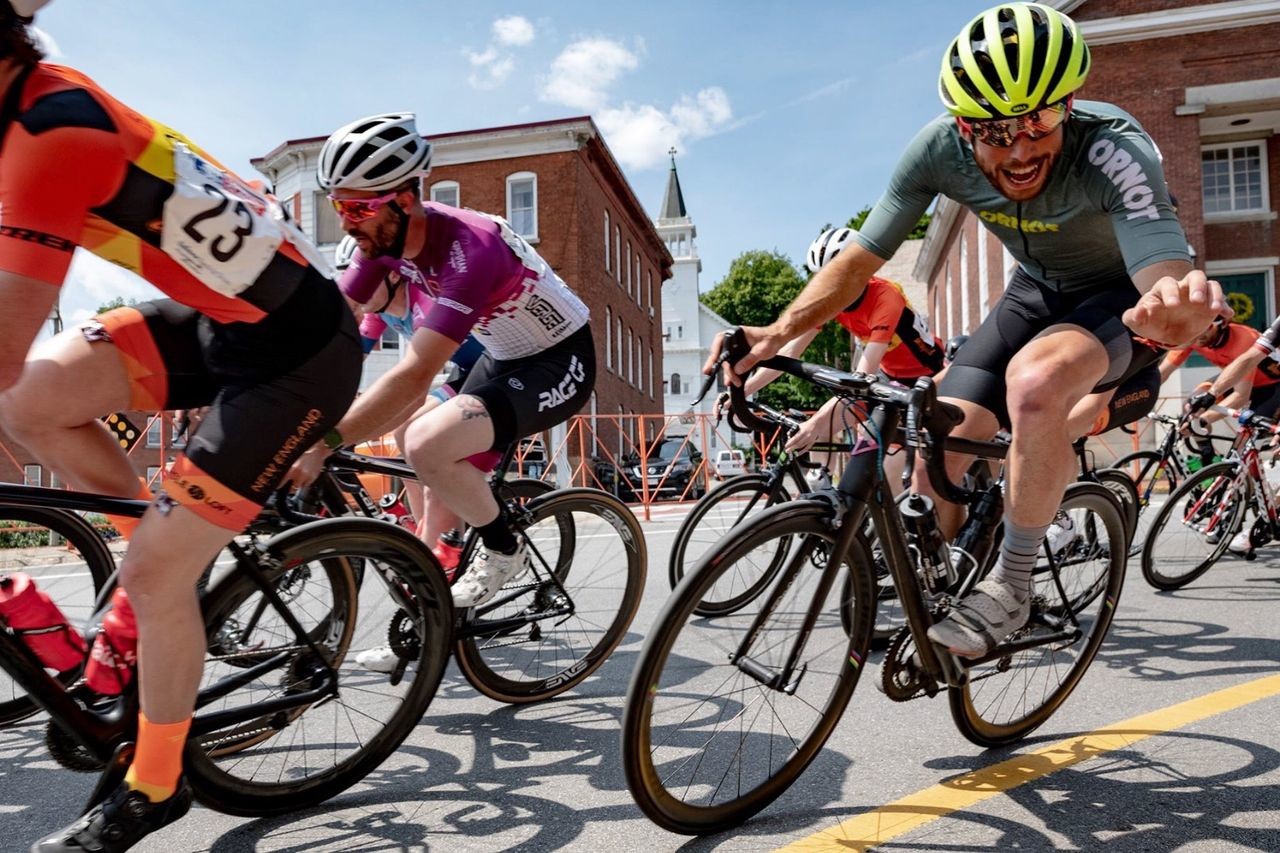
Ben Frederick is back racing his bike after suffering a traumatic brain injury. © Katie Busick
CXM: How does your past accident impact the way you ride or race?
BF: It depends on the race. More than once I’ve hit the brakes in a crit and lost the opportunity to win because it’s on my mind. But there are other times when the racer brain is on and there are no issues. Mountain biking, I will stay well within my comfort zone. I have the fewest amount of issues with ’cross.
Chasing the “Pro Dream” was a path that framed bikes and racing in a very specific way. Going from “Every training ride, watt and result matters” to “I can’t leave a dark room, nothing is worth making this happen again” to “I love racing my bike, no matter what level” is a hard journey to describe in a concise way.
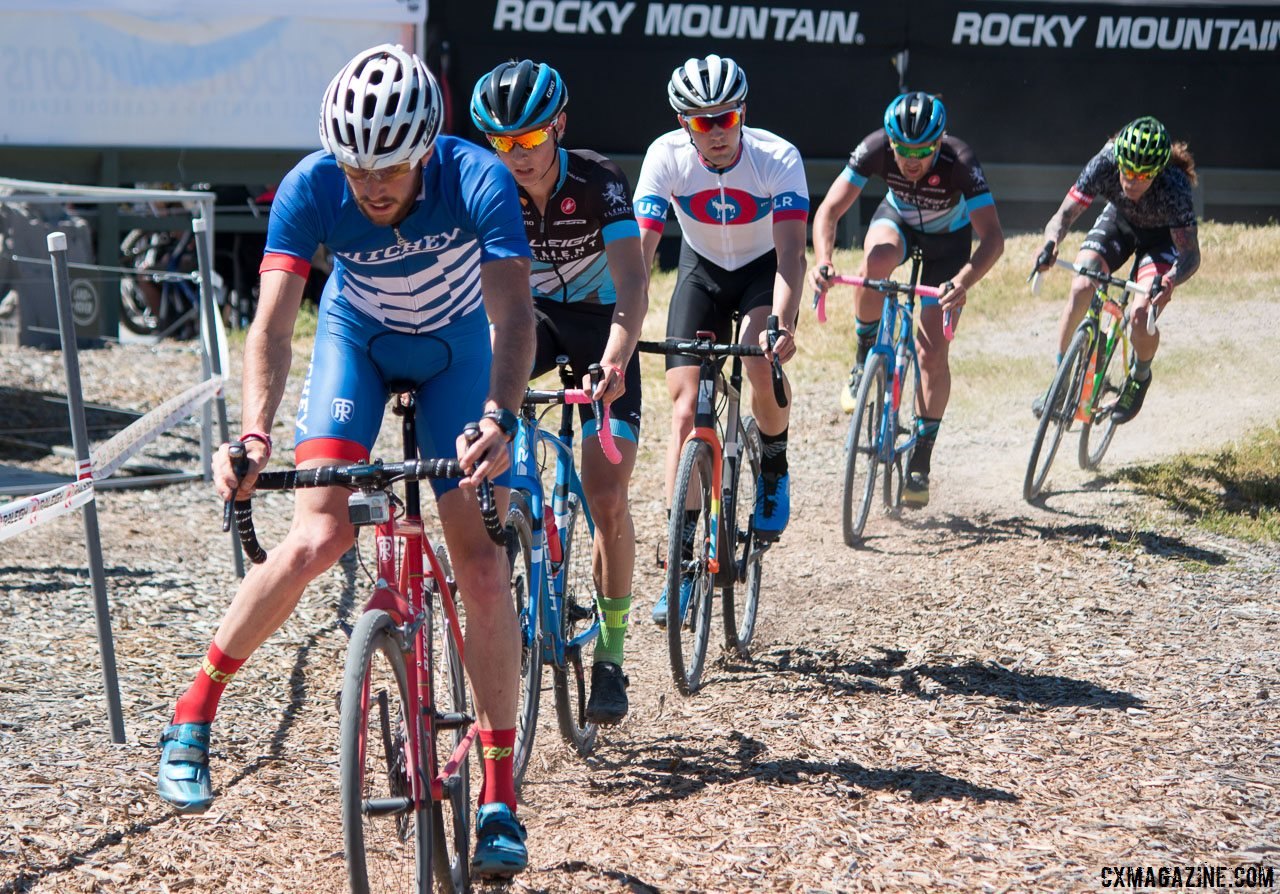
Wondering what could have been: Frederick led the Sea Otter Classic 2016 cyclocross race, but then got caught behind lapped traffic and then caught by the chase group. Now Frederick is thankful to be racing to podiums again. © Cyclocross Magazine
I needed to figure out if it was something worth risking everything again for. To manage my own expectations and to work on making bikes a healthy thing, I did some ’cross racing under the radar last year. This year I dabbled in some gravel events and crits, in the same weekend, on the same bike! Through the ups and downs, I found that I loved to race, to shut off everything but the next turn for an hour.
CXM: We bike racers and media focus so much on training, bodywork, injury prevention and recovery, with little attention to anything above the neck. We’ll obsess about recovery drinks and foam rollers, with little thought about the brain. What do you wish you knew, or want others to know about brain injuries? Both in terms of prevention and recovery?
BF: First, they take time to heal. My neurologist told me that a soft tissue injury—broken bone, deep bruise—takes “x” amount of time; connective tissue takes “x times two” and brains? Brains are “x times six.”
Secondly, every brain is like a snowflake. They all look the same, but each one is different. Some people have massive headaches and memory loss, mine was being very sensitive to visual and auditory stimulation as well as turning on depression and anxiety that I hadn’t experienced at that level before. I compared my recovery with others who had different symptoms and was hugely disappointed when my trajectory was different. Lastly, it will be okay. It will be hard, but it will be okay.
CXM: How does your accident impact your thoughts on helmet choice and technology?
BF: I keep my finger on what’s coming out. I was wearing a MIPS-equipped Bell Zephyr, and I hate to think about what could have happened without that technology. The WaveCel technology in the Bontrager stuff is very intriguing, especially if the claims are true.
But real talk, at the end of the day, bikes and the way I like to ride them have inherent risks. I had been riding 25 hours a week for 7 years, and my accident was the one in a million chance that I fell just so, doing something as easy as walking down a smooth hallway. It was like getting struck by lightning. I don’t want to stay inside for fear of getting struck. The safest thing for me would be to not ride or wear 10 feet of bubble wrap on my head but I’m not ready to go there yet.
CXM: One upside to my own brain injuries has been prioritizing sleep more. Any glass-half-full ways of looking at your own injury?
BF: I have a life now. I have friends who started as people I never met who would come over just to give me a hug and sit with me for 10 minutes before I got too exhausted. I have people who would take off work to drive me to Boston for my weekly physical, speech and cognitive therapies. I learned to love being outside for the sake of being outside, to hike and be in the trees. Instead of being a gypsy with a bike, traveling to different cities in the country with barely anyone who knew my name, I have a community and family in NECX that I get to see every weekend.
CXM: What keeps you busy during the average week?
BF: So much! I work at Whole Foods Market as a Customer Service Supervisor, I rock climb, I go roller skating, think Roll Bounce, I make fun of my friends while playing disc golf, I do my mental health work with a support group and therapy, I have a new amazing truck named Diane that I can sleep in and drive to beautiful places, oh, and I ride my bike sometimes, an average week is eight hours on the bike.
I live my life. When life can be reduced to a blacked-out room it makes a guy want to get out and live.
CXM: Thanks for chatting with me, and enjoy the ride.
BF: Thanks for the time!










